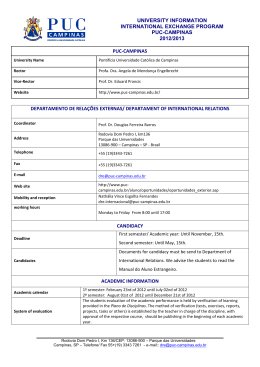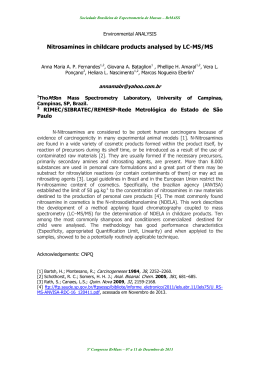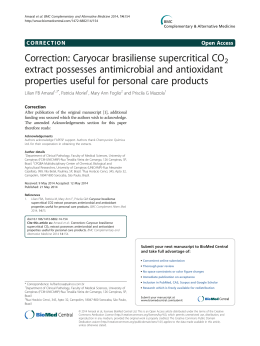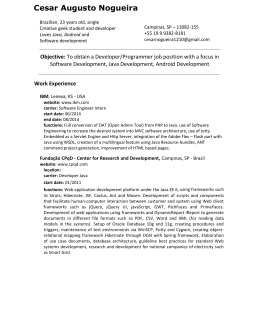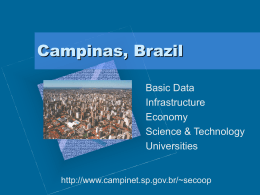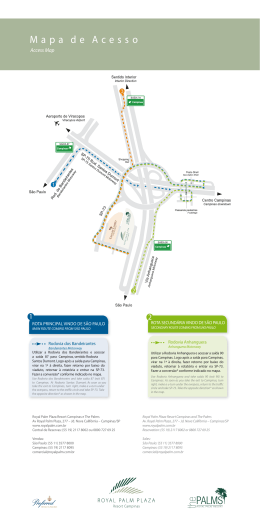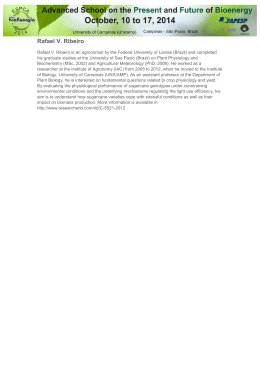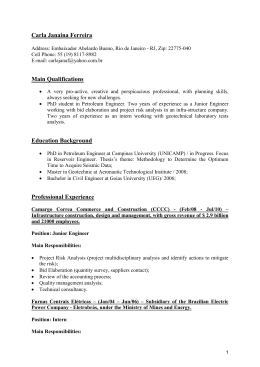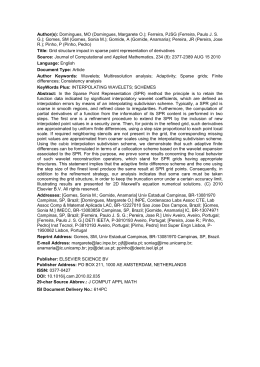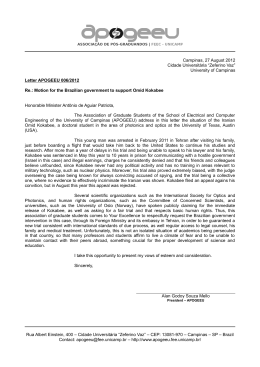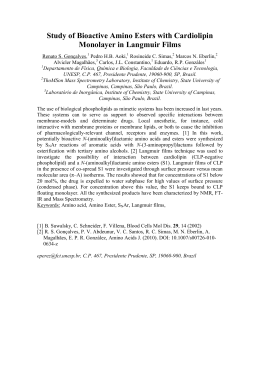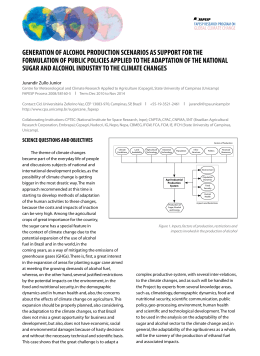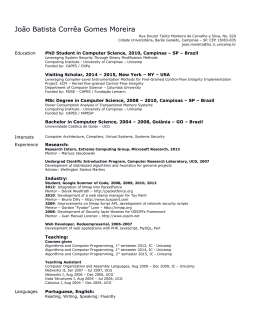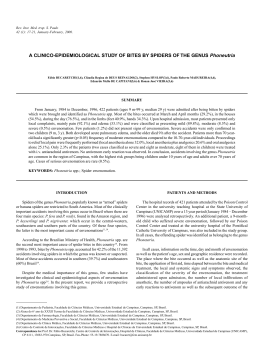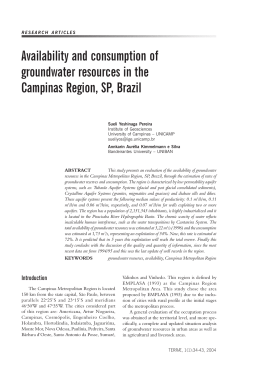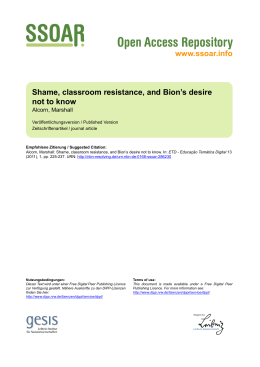EDITORIAL Dear readers, The special edition of this magazine entitled "Technologies in Education" features on its cover a symbolic representation made up of the figure of chalk in the classroom mixed with advanced technology, through the computer, Internet and Digital TV, among other technological devices, showing in a single image, the wishes of educators and other professionals about the perspective of educational development nowadays. Organized by professor Sérgio Ferreira do Amaral from UNICAMP Education Faculty, this special issue consists of national and international contributions that subsidy the internationalization of ETD journal - Digital Thematic Education - within the scientific community. Thanks the LANTEC1 Group and its researchers, especially Marcia Izabel Fugisawa Souza, it was possible to establish the interface between the Group and our editorial team, turning this project real. In this special issue we have eighteen texts: nine in the ARTICLES section, three in RESEARCH section, and six for the EXPERIENCE REPORTS section. Section ARTICLES, begins with the work "Experimenting the technological solutions within the PAULEX project to optimize the English test entrance exam to the university in Spain” of the authors, Jesús Garcia Laborda (Alcalá University), Ana Gimeno and Jose Macario de Siqueira (Valencia Polytechnic University). This article focuses on the initial trial of the solutions proposed by PAUER PAULEX Platform to perform "Prueba de Acceso a la Universidad" (PAU), i.e., university entrance tests in Spain through Internet. PAUER is a platform that integrates information and communication technology (ICT) for education and knowledge assessment dedicated to evaluate foreign languages. The platform is one of the main results of the research project Paulex-Universitas, which objective is to analyze the various possibilities offered by ICT for the creation, implementation and correction of the PAU foreign language test. 1 LANTEC - Laboratório de Novas Tecnologias Aplicadas na Educação – site de acesso: http://lantec.fae.unicamp.br/site/ vii © ETD – Educ. Tem. Dig., Campinas, v. 12, n. esp., p. vii-xi, mar. 2011 – ISSN: 1676-2592. EDITORIAL The second paper entitled "Didactic communication in virtual tutoring" written by authors of the National University of Distance Learning: Antonio Medina Rivilla, Maria Concepción Dominguez Garrido and Cristina Sánchez Romero, points out that didactics of communication in virtual tutoring is the basis for developing training content for the design of new curricula, as the virtual communication has become central for distance learning, and also, a key instrument to the students learning process. The authors discuss subjects such as: the resistance of students, teachers and tutors with respect to this way of virtual didactics communication, acquisition of essential skills for the development of educational efforts, competition of teacher training, and also, competition of digital technology. In "The fourth educational revolution: changes of time, space and relationships in school based on the use of technology and social inclusion", Ulysses F. Araújo (São Paulo University) discusses the evolution of education movements in the last centuries, showing how these movements of democratization and universal access to education, have promoted the inclusion of all people in the educational processes. The next work, "Collaborative learning and Web 2.0: a proposed model of organization of interactive contents” Tércia Zavaglia Torres (Embrapa Information Technology) and Sérgio do Amaral (State University of Campinas), discuss the encouragement of learning and improvement of student performance, using the technological tools of Web 2.0. However, according to the authors, this can only be achieved if there is a convergence of several factors that underlie educational practices. Patricia Núñez Gómez and Maria Luisa García Guardia (Complutense University of Madrid) in the article "Digital natives and new technologies: implementation in the university", present a part of the survey that has been developed by the gruposocmedia for several years about the digital natives and its relationship with new technologies. As for the sixth article, "Interactive White Board – IWB: assessment of didactic interaction and audiovisual narrative proposal", the authors Francisco Garcia Garcia and Rogério Garcia Fernandez, of the Complutense University of Madrid, together with Karla Isabel de Souza, from the State University of Campinas, propose that the viii © ETD – Educ. Tem. Dig., Campinas, v. 12, n. esp., p. vii-xi, mar. 2011 – ISSN: 1676-2592. EDITORIAL domain of elements of audiovisual narrative could be a theoretical possibility for the teacher who wants to produce audiovisual content to apply to digital platforms, such as the Interactive Digital Whiteboard (IWB). Also, in the ARTICLES section, the work "Open educational resources (OER): models for localization and adaptation" of Tel Amiel (State University of Campinas), Michael Orey (University of Georgia) and Richard West Neste (Utah State University) have questions regarding the location and the adaptation of digital educational resources. Following, Estéfano Vizconde Veraszto and Jomar Barros Filho, from Municipal Faculty "Professor. Franco Montoro", and Dirceu da Silva from State University of Campinas, authors of "Education, technology and society: causal relations of social influences on the technological decision processes” seek to understand how society influences technological development in daily life, starting from a theoretical model, which resulted in a Likert scale for use with university students of São Paulo. To conclude this section, Marcia Izabel Fugisawa Souza (Embrapa Information Technology - The Brazilian Agricultural Research Corporation), Luciana Oliveira Silva (Campinas Municipal Network) and Izabel Cristina Araújo (State University of Campinas) bring the work "Authoring on the web 2.0: educational view and hackers ethics” reflecting on the importance of exercising the authorship in a virtual environment of Web 2.0, considering that it is the foundation for the learning of both, the teacher and the student. Next, in the SEARCH section, the article of Carlos Otavio Schocair Mendes (Federal Center of Technological Education), Jorge Lopes de Souza Leão and Aloysio de Castro Pinto Pedroza (Federal University of Rio de Janeiro) – "Architecture and services for scalable distance learning education based on the SBTVD” diagnosed, through literature, that TV is present in 95.7% of Brazilian homes, indicating that it is an important instrument of mass communication. Faced with the Brazilian government proposal to promote social inclusion through courses using interactive digital TV, the authors contest, saying that on the other hand an excessive number of users could harm the functioning of the system, turning the problem not scalable. They also discuss ways ix © ETD – Educ. Tem. Dig., Campinas, v. 12, n. esp., p. vii-xi, mar. 2011 – ISSN: 1676-2592. EDITORIAL to facilitate distance learning, using technology such as the Brazilian System of Digital TV. Maria Campos Lage (Mackenzie University) on "Using NVivo software in qualitative research: an experiment in distance education", describes the use of the software NVivo in qualitative research, addressing the concepts involving softwares that support data analysis in general qualitative research, and also, the main features of NVivo in particular. In "A collaborative analysis of audiovisual production: an innovative experience in an elementary school" - the last work of the section, Monica Cristina Garbin (State University of Campinas) aims to analyze how the collaboration between students and teachers happened, so to build an educational video in an elementary school of Campinas, São Paulo, Brazil. Krista L. Gurko (Utah State University) opens the section REPORT OF EXPERIENCES, with the work "CAPES/FIPSE one year experience report: why begin with math learning objects?" - In this report the author describes the expectation of a student about being part of the first CAPES/FIPSE exchange program, which brought her to study at the University of Campinas, Brazil, coming directly from Utah State University, United States. This paper presents an overview of the project and of the student thoughts about the teacher’s responses besides future plans using digital learning objects. In the second paper "An experience with the use of Digital Interactive Whiteboard by early childhood professionals" author Elaine Messias Gomes (Campinas Municipal Network) brings hers working experience with professionals in this stage of education, and states that different teaching practices can be developed making use of interactive digital whiteboard. Ivana Maria Schnitman (Science and Technology Faculty) with "The pedagogical mediation and the success of an on-line educational experience" checks if there were a dependency between the success of an online educational experience and differences in the pedagogical interaction mediated by teachers on-line. The proposal of Rosemeire Ferreira da Silva (São Paulo University) in "Images techniques and distance education: Telecurso 2000" is to make a reflection on x © ETD – Educ. Tem. Dig., Campinas, v. 12, n. esp., p. vii-xi, mar. 2011 – ISSN: 1676-2592. EDITORIAL the professional, mercadologic and educative experience report, taking into consideration the limits of information and communication technology and the identification of its influences in the Telecourse 2000 educators’ and students’ discourse. And finally we have "Education in the age of digital TV: interfaces and connections", in which Simone de Lucena Ferreira (Tiradentes University) analyses some aspects of the introduction of digital TV in Portugal and Brazil, as well as the possibilities to use the Support Service for Teacher in the Classroom (SAPSA), developed by the Foundation Center for Research and Development in Telecommunications (CPqD). Noting the importance of the contributions received for this issue on the topic “technology in education”, we hope that you, dear readers, take advantage of ETD for your researches, thus, enabling your connection with the technology and education world. Happy reading! Gildenir Carolino Santos Scientific Editor ETD - Digital Thematic Education Special thanks: Rosemary Passos Technical Editor of ETD Faculty of Education - UNICAMP Paula Ferreira Agrell Technical formatter of ETD Faculty of Education - UNICAMP Leda Farah Reviewer Célia Maria Ribeiro Translator of Editorials Member of the Editorial Commitee xi © ETD – Educ. Tem. Dig., Campinas, v. 12, n. esp., p. vii-xi, mar. 2011 – ISSN: 1676-2592.
Download
